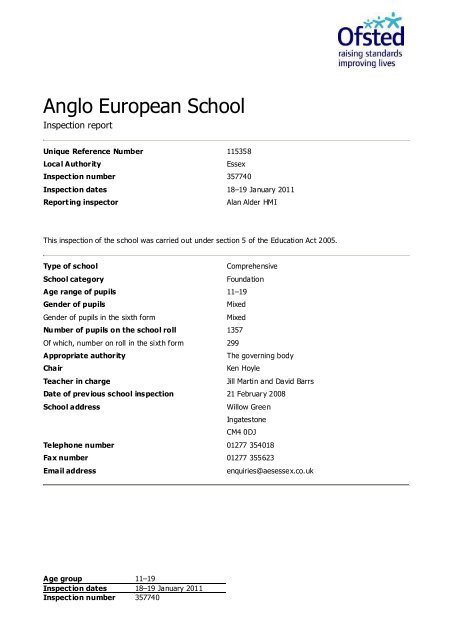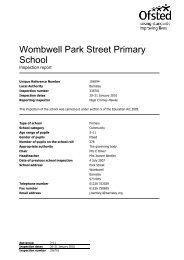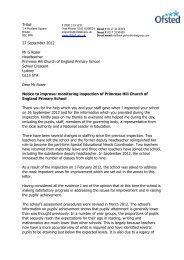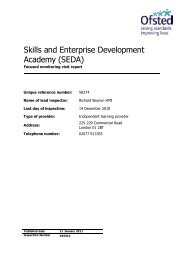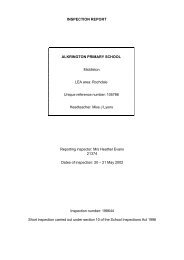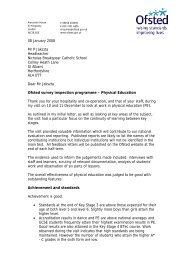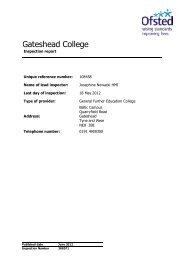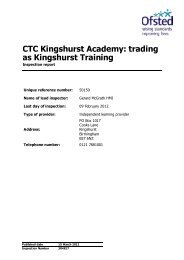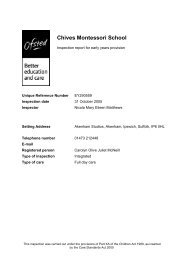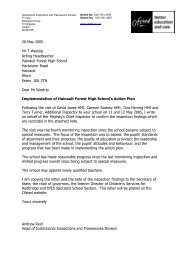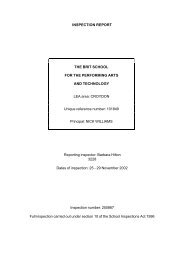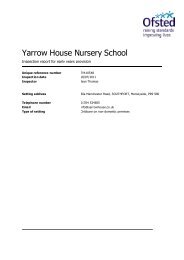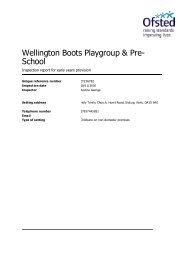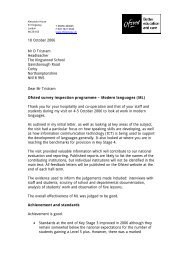Anglo European School - Ofsted
Anglo European School - Ofsted
Anglo European School - Ofsted
You also want an ePaper? Increase the reach of your titles
YUMPU automatically turns print PDFs into web optimized ePapers that Google loves.
<strong>Anglo</strong> <strong>European</strong> <strong>School</strong><br />
Inspection report<br />
Unique Reference Number 115358<br />
Local Authority Essex<br />
Inspection number 357740<br />
Inspection dates 18–19 January 2011<br />
Reporting inspector Alan Alder HMI<br />
This inspection of the school was carried out under section 5 of the Education Act 2005.<br />
Type of school Comprehensive<br />
<strong>School</strong> category Foundation<br />
Age range of pupils 11–19<br />
Gender of pupils Mixed<br />
Gender of pupils in the sixth form Mixed<br />
Nu mber of pupils on the school roll 1357<br />
Of which, number on roll in the sixth form 299<br />
Appropriate authority The governing body<br />
Chair Ken Hoyle<br />
Teacher in charge Jill Martin and David Barrs<br />
Date of previous school inspection 21 February 2008<br />
<strong>School</strong> address Willow Green<br />
Ingatestone<br />
CM4 0DJ<br />
Telephone number 01277 354018<br />
Fax number 01277 355623<br />
Email address enquiries@aesessex.co.uk<br />
Age group 11–19<br />
Inspection dates 18–19 January 2011<br />
Inspection number 357740
Inspection report: <strong>Anglo</strong> <strong>European</strong> <strong>School</strong>, 18–19 January 2011 2 of 14<br />
The Office for Standards in Education, Children's Services and Skills (<strong>Ofsted</strong>) regulates and inspects to<br />
achieve excellence in the care of children and young people, and in education and skills for learners of all<br />
ages. It regulates and inspects childcare and children's social care, and inspects the Children and Family<br />
Court Advisory Support Service (Cafcass), schools, colleges, initial teacher training, work-based learning and<br />
skills training, adult and community learning, and education and training in prisons and other secure<br />
establishments. It assesses council children's services, and inspects services for looked after children,<br />
safeguarding and child protection.<br />
Further copies of this report are obtainable from the school. Under the Education Act 2005, the school must<br />
provide a copy of this report free of charge to certain categories of people. A charge not exceeding the full<br />
cost of reproduction may be made for any other copies supplied.<br />
If you would like a copy of this document in a different format, such as large print or Braille, please<br />
telephone 0300 123 4234, or email enquiries@ofsted.gov.uk.<br />
You may copy all or parts of this document for non-commercial educational pur poses, as long as you give<br />
details of the source and date of publication and do not alter the documentation in any way.<br />
To receive regular email alerts about new publications, including survey reports and school inspection<br />
reports, please visit our website and go to 'Subscribe'.<br />
Royal Exchange Buildings<br />
St Ann's Square<br />
Manchester<br />
M2 7LA<br />
T: 0300 123 4234<br />
Textphone: 0161 618 8524<br />
E: enquiries@ofsted.gov.uk<br />
W: www.ofsted.gov.uk<br />
© Crown copyright 2011
Inspection report: <strong>Anglo</strong> <strong>European</strong> <strong>School</strong>, 18–19 January 2011 3 of 14<br />
Introduction<br />
This inspection was carried out by one of Her Majesty's Inspectors and four additional<br />
inspectors. They observed 38 lessons, led by 38 different teachers. Meetings were held<br />
with groups of students, members of the school's staff and the Chair of the Governing<br />
Body. Inspectors observed the school's work, and scrutinised a wide range of documents<br />
including those relating to safeguarding, students' performance data, the school's records<br />
of lesson observations as well as action plans. In addition questionnaires were analysed<br />
from 78 parents and carers, 131 students and 92 members of staff.<br />
The inspection team reviewed many aspects of the school's work. It looked in detail at a<br />
number of key areas.<br />
��The progress made by different groups of students in their learning, and any<br />
variations between the main school and the sixth form.<br />
��How accurately the school assesses its own performance, and particularly the quality<br />
of teaching.<br />
Information about the school<br />
This school is larger than the average secondary school. The proportion of students known<br />
to be eligible for free school meals is much lower than the national average and the<br />
proportion who are from minority ethnic groups, including those who speak English as an<br />
additional language, is above the national average. The proportion of students who have<br />
special educational needs and/or disabilities, including those who have a statement of<br />
special educational needs, is below average. The school draws students from a very wide<br />
and diverse area and is regularly oversubscribed for places in Year 7.<br />
The school's specialism is modern foreign languages. This matches its international focus.<br />
Approximately half of the students spend some time during the school year visiting a<br />
foreign country as part of their education, and some students spend two months in a<br />
German school working alongside German students. The great majority of students in the<br />
main school study at least two modern foreign languages. The school holds a number of<br />
awards including the International <strong>School</strong> and Accord awards and Healthy <strong>School</strong>s status<br />
and recognition by the International Baccalaureate as a World <strong>School</strong>.
Inspection report: <strong>Anglo</strong> <strong>European</strong> <strong>School</strong>, 18–19 January 2011 4 of 14<br />
Inspection grades: 1 is outstanding, 2 is good, 3 is satisfactory, and 4 is inadequate<br />
Please turn to the glossary for a description of the grades and inspection terms<br />
Inspection judgements<br />
Overall effectiveness: how good is the school? 3<br />
The school's capacity for sustained improvement 2<br />
Main findings<br />
<strong>Anglo</strong> <strong>European</strong> <strong>School</strong> is a satisfactory school which has an outstanding sixth form. Some<br />
aspects of provision are excellent, and the students' personal development is outstanding<br />
throughout the school. However, the quality of teaching is satisfactory and this means that<br />
students in the main school make no better than satisfactory progress in their work. As a<br />
result, the school's overall effectiveness is satisfactory. Students join the school in Year 7<br />
with above average attainment. It remains significantly above average by the time they<br />
take their examinations at the end of Year 11. All aspects of provision and outcomes in the<br />
sixth form are outstanding.<br />
The school has a very strong ethos, which strongly guides its work. Its influence is clearly<br />
evident in the way the school provides for students. The curriculum, for example, is<br />
unusually challenging with two modern foreign languages taken by most students. In<br />
addition there is a requirement for students to study a humanities subject as well as a<br />
technology subject. In the sixth form, many students study the International<br />
Baccalaureate. There is a very wide range of opportunities for students of all ages; this<br />
includes travel to foreign countries, which about half the students take part in each year.<br />
The opportunities students have to engage with students and families from other cultures<br />
are unusually extensive. The ethos has a very positive effect on students' personal<br />
development. There is a clear mutual respect of people's differences. Relationships with<br />
adults are good and students speak with them confidently. Students also work well<br />
collaboratively and this, combined with high attendance levels and strong basic skills,<br />
helps to ensure that their preparation for future economic well-being is outstanding.<br />
Teaching is satisfactory. However, the lessons that inspectors observed covered the full<br />
spectrum from outstanding to one that was inadequate. Students show a commendable<br />
desire to learn, but lesson planning does not always take advantage of this. In particular,<br />
information about students' prior knowledge is not always used to set and adjust tasks in<br />
line with students' different abilities. Similarly, the generally good use of varied teaching<br />
methods is sometimes undermined by insufficient pace.<br />
The school's capacity to improve is good. Attendance is rising impressively and attainment<br />
is improving. The management of this unusually complex school is effective. The subject<br />
leaders are involved well in detailed and accurate evaluations of their areas of<br />
responsibility. Senior leaders are aware of where the school's strengths and weaknesses<br />
lie, and take the necessary actions to bring about improvement. This is leading to<br />
improvement in some recently underperforming subjects. Where groups of students have<br />
underachieved in the past, this has not been repeated. There is a commendable concern<br />
to keep improving the quality of teaching and a range of support mechanisms are in place<br />
to do this. However, some over-generous grading of teaching results from too much
Inspection report: <strong>Anglo</strong> <strong>European</strong> <strong>School</strong>, 18–19 January 2011 5 of 14<br />
Inspection grades: 1 is outstanding, 2 is good, 3 is satisfactory, and 4 is inadequate<br />
Please turn to the glossary for a description of the grades and inspection terms<br />
emphasis being placed on what the teacher does in a lesson, rather than its impact on<br />
learning.<br />
Up to 40% of the schools whose overall effectiveness is judged satisfactory may receive a<br />
monitoring visit by an <strong>Ofsted</strong> inspector before their next section 5 inspection.<br />
What does the school need to do to improve further?<br />
�� Improve the progress that students make in their learning, so that it is at least<br />
good, by ensuring that the best practice in the following areas is standard practice in<br />
lessons:<br />
maintaining a good pace of teaching and learning<br />
using data more comprehensively in setting tasks that are related to the abilities<br />
of individual students<br />
checking students' understanding during lessons and adapting the teaching<br />
where necessary.<br />
��Ensure that the monitoring of teaching quality is robust by:<br />
ensuring that judgements about the quality of teaching in each lesson take fully<br />
into account the extent of learning that takes place in the lesson.<br />
Outcomes for individuals and groups of pupils 3<br />
Students reach above average standards in their work. The proportion of students who<br />
achieve five or more higher grade GCSE passes, including English and mathematics, is<br />
significantly above the national average. The proportion who achieve a higher grade pass<br />
in a modern foreign language is almost three times the national average. All groups of<br />
students of significant size attain more highly in their best eight subjects, including English<br />
and mathematics, than do their counterparts nationally. However, when they arrive in<br />
Year 7, students' attainment is above average and the progress they make in their<br />
learning, both overall and in specific subject such as English and mathematics is<br />
satisfactory. This was the case in the GCSE examinations in 2010 and inspectors confirmed<br />
this in their observation of lessons. Students who have special educational needs and/or<br />
disabilities are appropriately supported so that they also make satisfactory progress.<br />
Students' high attendance, outstanding behaviour and attitudes to work make a good<br />
contribution to the progress they make both in their academic learning and in their<br />
personal development. They are polite, respectful of others and at ease when speaking<br />
with adults. The exclusion rate is very low and this reflects the quality of behaviour seen in<br />
classrooms and around the school generally. The students' questionnaires showed that<br />
they feel very safe in school.
Inspection report: <strong>Anglo</strong> <strong>European</strong> <strong>School</strong>, 18–19 January 2011 6 of 14<br />
Inspection grades: 1 is outstanding, 2 is good, 3 is satisfactory, and 4 is inadequate<br />
Please turn to the glossary for a description of the grades and inspection terms<br />
These are the grades for pupils' outcomes<br />
Pupils' achievement and the extent to which they enjoy their learning 3<br />
Taking into account:<br />
Pupils' attainment¹<br />
The quality of pupils' learning and their progress 3<br />
The quality of learning for pupils with special educational needs and/or disabilities<br />
and their progress<br />
The extent to which pupils feel safe 1<br />
Pupils' behaviour 1<br />
The extent to which pupils adopt healthy lifestyles 2<br />
The extent to which pupils contribute to the school and wider community 1<br />
The extent to which pupils develop workplace and other skills that will contribute to<br />
their future economic well-being<br />
Taking into account:<br />
Pupils' attendance¹<br />
The extent of pupils' spiritual, moral, social and cultural development 1<br />
1 The grades for attainment and attendance are: 1 is high; 2 is above average; 3 is broadly average; and 4<br />
is low<br />
How effective is the provision?<br />
Lessons generally feature a good mix of activities, including collaborative group work and<br />
individual work. This maintains students' interest and helps to keep them well motivated.<br />
In an outstanding mathematics lesson, students' learning was impressively developed by<br />
the teacher's focus on their understanding of mathematical processes rather than on<br />
simply how to solve the problems set. In a small minority of lessons, the motivation of one<br />
or two individuals was not matched by the opportunities provided. For example, a moreable<br />
student had completed the work set, and finished his work early because of the<br />
absence of extension activities. In a lesson in which assessment was used well, the<br />
teacher used questions to establish understanding and adapted the teaching accordingly.<br />
The teacher's knowledge of students' abilities was used well in a lesson where the<br />
difficulty of questions was geared closely to the ability of the individual students being<br />
asked. However, the use of such information is generally no better than satisfactory.<br />
The curriculum is innovative. It includes well-developed cross-curricular provision and a<br />
strong international dimension. The range of languages taught, which includes Russian,<br />
Chinese and Japanese as well as several <strong>European</strong> languages, is impressive. Extracurricular<br />
and enrichment activities are extensive. Students' cultural and social<br />
development is outstanding. This is helped by the very strong emphasis placed on<br />
international study. It leads not only to frequent overseas visits for learning, but also<br />
permeates what is taught in the classroom. For example, in one lesson some cross-<br />
1<br />
3<br />
1<br />
1
Inspection report: <strong>Anglo</strong> <strong>European</strong> <strong>School</strong>, 18–19 January 2011 7 of 14<br />
Inspection grades: 1 is outstanding, 2 is good, 3 is satisfactory, and 4 is inadequate<br />
Please turn to the glossary for a description of the grades and inspection terms<br />
curricular work linked the learning of fractions with ancient Egyptian culture. There is also<br />
good provision for students whose interests and aspirations lie outside academic work.<br />
They are able to take a more work-related approach through the school's partnership with<br />
a local college.<br />
Care, guidance and support are outstanding. The work to increase attendance from what<br />
was already above average has been highly effective. Students are looked after extremely<br />
well. Safeguarding is a complex area for the school, partly because it places students with<br />
foreign families for quite lengthy periods of time and also arranges similarly lengthy return<br />
visits by foreign students. The work done to ease the transition process from primary to<br />
secondary and through the different stages of secondary school life is exemplary. It<br />
includes individual counselling for students in Year 9 and 11 and in the sixth form.<br />
These are the grades for the quality of provision<br />
The quality of teaching 3<br />
Taking into account:<br />
The use of assessment to support learning<br />
The extent to which the curriculum meets pupils' needs, including, where relevant,<br />
through partnerships<br />
The effectiveness of care, guidance and support 1<br />
How effective are leadership and management?<br />
The senior leaders are innovative in their approach and continue to introduce new<br />
features to the school. Recently it has been the only state school in the country to provide<br />
the International Baccalaureate Career-Related Certificate, for example. There are clear<br />
lines of accountability for senior and middle leaders. These include regular means by<br />
which senior leaders provide support and challenge to middle leaders, such as those who<br />
are responsible for subjects: their work in bringing about improvement is developing well<br />
as a result. However, the plans for improvement lack sufficient measurable targets and<br />
indications of expected progress at intervals through the year. This makes it difficult for<br />
proper evaluation of progress to bring about a change of approach or an increase in<br />
resources if necessary.<br />
The governing body knows the school well and plays a strong part in deciding its strategic<br />
direction. It is fully involved in deciding the school's statutory targets. The engagement<br />
with parents and carers is good. A very high proportion attends the parents' evenings.<br />
Information provided to parents and carers about students' progress is regular and of<br />
good frequency. The school's work to improve attendance shows evidence of effective<br />
liaison with parents and carers, but the work to increase the progress made by students is<br />
satisfactory. This is reflected in the responses parents and carers made to the inspection<br />
questionnaire. The promotion of equality is good. The ethos of the school conveys a very<br />
powerful and effective anti-discriminatory message. Safeguarding is outstanding. Policies<br />
and procedures follow the very best practice and fully meet national requirements,<br />
including the detailed work that is done to ensure students' safety and well-being in school<br />
and on visits and residential experiences. Appropriate steps are taken to ensure the school<br />
3<br />
1
Inspection report: <strong>Anglo</strong> <strong>European</strong> <strong>School</strong>, 18–19 January 2011 8 of 14<br />
Inspection grades: 1 is outstanding, 2 is good, 3 is satisfactory, and 4 is inadequate<br />
Please turn to the glossary for a description of the grades and inspection terms<br />
site is secure and monitored. Community cohesion is good. It is particularly strong in<br />
terms of the international dimension.<br />
These are the grades for leadership and management<br />
The effectiveness of leadership and management in embedding ambition and driving<br />
improvement<br />
Taking into account:<br />
The leadership and management of teaching and learning<br />
The effectiveness of the governing body in challenging and supporting the<br />
school so that weaknesses are tackled decisively and statutory responsibilities met<br />
The effectiveness of the school's engagement with parents and carers 2<br />
The effectiveness of partnerships in promoting learning and well-being 2<br />
The effectiveness with which the school promotes equality of opportunity and tackles<br />
discrimination<br />
The effectiveness of safeguarding procedures 1<br />
The effectiveness with which the school promotes community cohesion 2<br />
The effectiveness with which the school deploys resources to achieve value for money 3<br />
Sixth form<br />
Students in the sixth form make outstanding progress, particualrly in their GCE Advanced<br />
courses. Students are highly confident and speak very positively of their experiences in the<br />
sixth form. They play an important role in the school and the community, for example<br />
teaching modern foreign languages in primary schools.<br />
Teachers' subject knowledge is very good, as is the quality of teaching. Students say that<br />
they are suitably challenged and that the teachers' expectations of them are very high.<br />
The curriculum is is broad and has recently been further developed to include the<br />
International Baccalaureate Careers Certificate, unique in this country. Leadership of the<br />
sixth form is highly effective and has a clear focus on further improving students' personal<br />
and academic development. One aspect of this is that some students spend two weeks in<br />
Germany on work experience, while maintaining their school studies via computer links.<br />
Students' progress is monitored effectively, and the resulting information used to remedy<br />
any underachievement. A high proportion of students go on to university, many to their<br />
first choice.<br />
2<br />
3<br />
2<br />
2
Inspection report: <strong>Anglo</strong> <strong>European</strong> <strong>School</strong>, 18–19 January 2011 9 of 14<br />
Inspection grades: 1 is outstanding, 2 is good, 3 is satisfactory, and 4 is inadequate<br />
Please turn to the glossary for a description of the grades and inspection terms<br />
These are the grades for the sixth form<br />
Overall effectiveness of the sixth form 1<br />
Taking into account:<br />
Outcomes for students in the sixth form<br />
The quality of provision in the sixth form 1<br />
Leadership and management of the sixth form 1<br />
Views of parents and carers<br />
The proportion of parents and carers who responded to the questionnaire was much lower<br />
than average, and their views may therefore not be fully representative. They are less<br />
positive than the teachers' and the students' views. However, a greater proportion than<br />
average agrees with the statements that their child enjoys school and is safe there.<br />
1
Inspection report: <strong>Anglo</strong> <strong>European</strong> <strong>School</strong>, 18–19 January 2011 10 of 14<br />
Responses from parents and carers to <strong>Ofsted</strong>'s questionnaire<br />
<strong>Ofsted</strong> invited all the registered parents and carers of pupils registered at <strong>Anglo</strong> <strong>European</strong> <strong>School</strong> to<br />
complete a questionnaire about their views of the school.<br />
In the questionnaire, parents and carers were asked to record how strongly they agreed with 13 statements<br />
about the school. The inspection team received 78 completed questionnaires by the end of the on-site<br />
inspection. In total, there are 1357 pupils registered at the school.<br />
Statements<br />
Strongly<br />
agree<br />
Agree Disagree<br />
Strongly<br />
disagree<br />
Total % Total % Total % Total %<br />
My child enjoys school 39 50 32 41 7 9 0 0<br />
The school keeps my child<br />
safe<br />
My school informs me about<br />
my child's progress<br />
My child is making enough<br />
progress at this school<br />
The teaching is good at this<br />
school<br />
The school helps me to<br />
support my child's learning<br />
The school helps my child to<br />
have a healthy lifestyle<br />
The school makes sure that<br />
my child is well prepared for<br />
the future (for example<br />
changing year group,<br />
changing school, and for<br />
children who are finishing<br />
school, entering further or<br />
higher education, or entering<br />
employment)<br />
The school meets my child's<br />
particular needs<br />
The school deals effectively<br />
with unacceptable behaviour<br />
The school takes account of<br />
my suggestions and concerns<br />
The school is led and<br />
managed effectively<br />
Overall, I am happy with my<br />
child's experience at this<br />
school<br />
37 47 39 50 2 3 0 0<br />
25 32 43 55 10 13 0 0<br />
32 41 30 38 12 15 1 1<br />
28 36 32 41 17 22 0 0<br />
22 28 40 51 14 18 0 0<br />
21 27 40 51 15 19 0 0<br />
34 44 27 35 7 9 2 3<br />
36 46 27 35 11 14 0 0<br />
28 36 34 44 13 17 0 0<br />
24 31 34 44 9 12 2 3<br />
42 54 26 33 5 6 0 0<br />
36 46 34 44 7 9 0 0<br />
The table above summarises the responses that parents and carers made to each statement. The<br />
percentages indicate the proportion of parents and carers giving that response out of the total number of<br />
completed questionnaires. Where one or more parents and carers chose not to answer a particular question,<br />
the percentages will not add up to 100%.
Inspection report: <strong>Anglo</strong> <strong>European</strong> <strong>School</strong>, 18–19 January 2011 11 of 14<br />
Glossary<br />
What inspection judgements mean<br />
Grade Judgement Description<br />
Grade 1 Outstanding These features are highly effective. An outstanding school<br />
provides exceptionally well for all its pupils' needs.<br />
Grade 2 Good These are very positive features of a school. A school that<br />
is good is serving its pupils well.<br />
Grade 3 Satisfactory These features are of reasonable quality. A satisfactory<br />
school is providing adequately for its pupils.<br />
Grade 4 Inadequate These features are not of an acceptable standard. An<br />
inadequate school needs to make significant improvement<br />
in order to meet the needs of its pupils. <strong>Ofsted</strong> inspectors<br />
will make further visits until it improves.<br />
Overall effectiveness of schools<br />
Overall effectiveness judgement (percentage of schools)<br />
Type of school Outstanding Good Satisfactory Inadequate<br />
Nursery schools 59 35 3 3<br />
Primary schools 9 44 39 7<br />
Secondary schools 13 36 41 11<br />
Sixth forms 15 39 43 3<br />
Special schools 35 43 17 5<br />
Pupil referral units 21 42 29 9<br />
All schools 13 43 37 8<br />
New school inspection arrangements were introduced on 1 September 2009. This means that inspectors now<br />
make some additional judgements that were not made previously.<br />
The data in the table above are for the period 1 September 2009 to 31 August 2010 and are consistent with<br />
the latest published official statistics about maintained school inspection outcomes (see<br />
www.ofsted.gov.uk).<br />
The sample of schools inspected during 2009/10 was not representative of all schools nationally, as weaker<br />
schools are inspected more frequently than good or outstanding schools.<br />
Percentages are rounded and do not always add exactly to 100.<br />
Sixth form figures reflect the judgements made for the overall effectiveness of the sixth form in secondary<br />
schools, special schools and pupil referral units.
Inspection report: <strong>Anglo</strong> <strong>European</strong> <strong>School</strong>, 18–19 January 2011 12 of 14<br />
Common terminology used by inspectors<br />
Achievement: the progress and success of a pupil in their learning,<br />
development or training.<br />
Attainment: the standard of the pupils' work shown by test and<br />
examination results and in lessons.<br />
Capacity to improve: the proven ability of the school to continue<br />
improving. Inspectors base this judgement on what<br />
the school has accomplished so far and on the quality<br />
of its systems to maintain improvement.<br />
Leadership and management: the contribution of all the staff with responsibilities,<br />
not just the headteacher, to identifying priorities,<br />
directing and motivating staff and running the school.<br />
Learning: how well pupils acquire knowledge, develop their<br />
understanding, learn and practise skills and are<br />
developing their competence as learners.<br />
Overall effectiveness: inspectors form a judgement on a school's overall<br />
effectiveness based on the findings from their<br />
inspection of the school. The following judgements,<br />
in particular, influence what the overall effectiveness<br />
judgement will be.<br />
��The school's capacity for sustained<br />
improvement.<br />
��Outcomes for individuals and groups of pupils.<br />
��The quality of teaching.<br />
��The extent to which the curriculum meets<br />
pupils' needs, including, where relevant,<br />
through partnerships.<br />
��The effectiveness of care, guidance and<br />
support.<br />
Progress: the rate at which pupils are learning in lessons and<br />
over longer periods of time. It is often measured by<br />
comparing the pupils' attainment at the end of a key<br />
stage with their attainment when they started.
Inspection report: <strong>Anglo</strong> <strong>European</strong> <strong>School</strong>, 18–19 January 2011 13 of 14<br />
This letter is provided for the school, parents and<br />
carers to share with their children. It describes <strong>Ofsted</strong>'s<br />
main findings from the inspection of their school.<br />
20 January 2011<br />
Dear Students<br />
Inspection of <strong>Anglo</strong> <strong>European</strong> <strong>School</strong>, Ingatestone, CM4 0DJ<br />
Thank you for the help you gave us when we inspected your school. We spoke to quite a<br />
number of you and were impressed by your confidence and maturity.<br />
We found that your school is satisfactory, although it has a number of outstanding<br />
characteristics. The curriculum, with its emphasis on modern foreign languages and its<br />
international approach, is a good example. We also judged your behaviour to be<br />
outstanding. You show this around the school and also in classrooms, where your<br />
commitment to learning is clearly evident. Your ease with people who may be different<br />
from you is an impressive feature. These aspects of your behaviour are helped by the<br />
school's curriculum and approaches to teaching. These also help you to develop<br />
impressively morally, cultural and socially and spiritually.<br />
We noted that in the questionnaires a number of you completed, a very high proportion of<br />
you had positive views about your school. For example, you agree that the headteacher<br />
and senior staff do a good job, you are shown how to improve your work, you are well<br />
prepared for the future, you know how well you are doing, you feel safe and you enjoy<br />
school. Inspectors found evidence to support these views.<br />
Nevertheless, there are areas in which your school can improve. Although you achieve<br />
high standards in your work, you are making satisfactory progress and should be making<br />
at least good progress. Inspectors have recommended that teaching becomes more<br />
challenging to help you to do this and have recommended to the school's leaders ways in<br />
which this should be brought about. The school may receive a one-day monitoring visit<br />
from an inspector before the next inspection to check that your progress is increasing.<br />
Yours sincerely<br />
Alan Alder<br />
Her Majesty's Inspector
Inspection report: <strong>Anglo</strong> <strong>European</strong> <strong>School</strong>, 18–19 January 2011 14 of 14<br />
Any complaints about the inspection or the report should be made following the procedures set<br />
out in the guidance 'Complaining about inspections', which is available from <strong>Ofsted</strong>'s website:<br />
www.ofsted.gov.uk. If you would like <strong>Ofsted</strong> to send you a copy of the guidance, please<br />
telephone 0300 123 4234, or email enquiries@ofsted.gov.uk.


